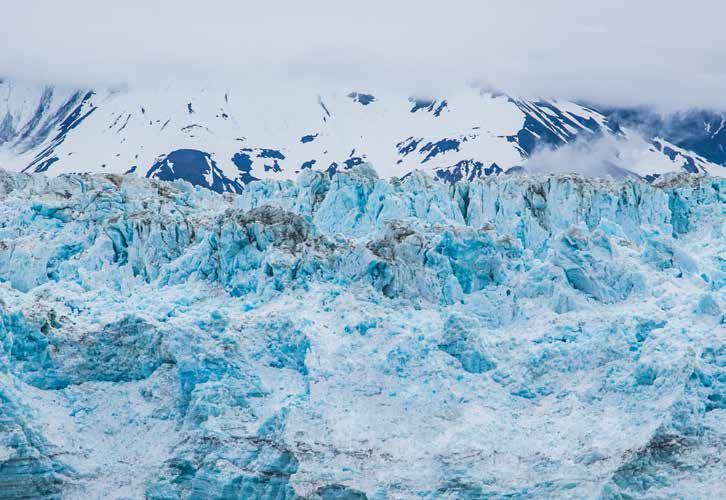
A deafening roar assaulted our ears as a house-sized iceberg crashed into the water and another warehouse-sized chunk of blackened ice rose up out of the water, high into the sky. As Alaska’s Columbia Glacier calved (broke off) yet another expansive section of its blue ice face, we were filled with radical amazement.
Standing on the deck of a boat floating amongst SUV-sized icebergs strewn all around Alaska’s Columbia Bay, we quickly understood that we are infinitesimally small actors on the stage of Creation. The world is growing and changing all around us, in awesome and frightening ways. As the wise Rabbi known as the Baal Shem Tov aptly cautioned us to remember: M’lo chol haaretz k’vodo – the whole earth is filled with Majestic Holiness – but we humans take our little hands and cover our eyes. We miss it.
We who live in a city or its suburbs can easily become separated from the rhythms of nature. We notice some things: A flower blossoms. A stream flows by. The California sun scorches our garden. We alter our haircuts. We take a different route to work. We redecorate a few rooms in the house. But fundamentally, while the world around us changes significantly, to us it appears unchanging and static.
That human-centered perspective ignores the awesome magnificence that surrounds us on this little planet we call home. And that’s why, every year, Jews and Jewish families need to gather together on Rosh Hashana.
The Jewish New Year, Rosh Hashana (literally, “the head of the year”) is about more than a delicious meal shared with family and friends around the dining room table or By Rabbi Paul Kipnes, Congregation Or Ami a day or two spent in the synagogue singing, praying, and counting our blessings. According to our ancient rabbis, Rosh Hashana marks “the day – according to Jewish tradition – that God created the world” (Hayom harat ha-olam).
 The Hebrew word harat is related to birthing. The Source of Life, according to some commentators, birthed a new existence in those first moments of Creation. Like a woman lovingly birthing a baby, like an Alaskan glacier calving its icebergs, the Creator of All, according to the Kabbalistic mystics, separated out some of the Divine holy light to create our universe. Rosh Hashana, therefore, might be described as “the birthday of the world.”
The Hebrew word harat is related to birthing. The Source of Life, according to some commentators, birthed a new existence in those first moments of Creation. Like a woman lovingly birthing a baby, like an Alaskan glacier calving its icebergs, the Creator of All, according to the Kabbalistic mystics, separated out some of the Divine holy light to create our universe. Rosh Hashana, therefore, might be described as “the birthday of the world.”
On birthdays, we celebrate another year of life. We count the blessings from the year gone by and evaluate the ways that our lives failed to live up to the dreams we had. We recognize that we are changing and fragile. On our birthdays, we commit to making the coming year a better and healthier one for ourselves and our loved ones.
On Rosh Hashana, the birthday of our world, we similarly reflect upon the blessings we experienced from our planet over the past year: in nature, in our gardens, down by the beach, and in relationships with others. On Rosh Hashana, we take stock of our existence and admit an awesome truth: that our world too is both changing and fragile and it needs our attention to protect it from the ravages of time and humanity. On Rosh Hashana, we bless the world and the Holy One who created it.
And we learn these lessons:
That being ever-changing, we humans want to notice the beauty of each moment of life before it inevitably moves on.
That living in a fragile world, we humans are God’s partners, striving to nurture an ever-blossoming Creation.
That this is an amazing planet we live on. As Rabbi Abraham Joshua Heschel wrote: “Our goal should be to live life in radical amazement…get up in the morning and look at the world in a way that takes nothing for granted. Everything is phenomenal; everything is incredible; never treat life casually. To be spiritual is to be amazed.”
So this Rosh Hashana, enjoy the dinner with family and friends (or wish your Jewish friends “Shana Tova – Happy New Year”). Go to a synagogue to pray and give thanks (information about Congregation Or Ami’s services at the Thousand Oaks Civic Arts Center is at orami.org/HHD). And take a moment to praise Creation, for it is amazing.
By Rabbi Paul Kipnes, Congregation Or Ami


